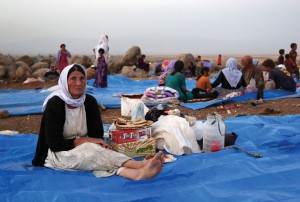Lawmakers flabbergasted by lack of action to address crimes against humanity
By Evan Wilt
(WNS)–A bipartisan group of lawmakers on Sept. 22 bemoaned the Obama administration’s lack of action since acknowledging the ongoing genocide of religious and ethnic minorities in the Middle East.
“They made the genocide declaration—and we’re glad they finally did—but now what? And the now what has been a big zero,” said Rep. Chris Smith, R-N.J., who leads The Helsinki Commission, an independent government agency which works to advance human rights around the world.
 Secretary of State John Kerry admitted in March the Islamic State (ISIS) is committing genocide against Christians, Yazidis, and other minorities within Iraq and Syria. Advocates had asked the State Department to make the determination for years. But today, lawmakers on the Helsinki Commission accused the Obama administration of saying the right things but not making genocide victims a foreign policy priority.
Secretary of State John Kerry admitted in March the Islamic State (ISIS) is committing genocide against Christians, Yazidis, and other minorities within Iraq and Syria. Advocates had asked the State Department to make the determination for years. But today, lawmakers on the Helsinki Commission accused the Obama administration of saying the right things but not making genocide victims a foreign policy priority.
Sen. Ben Cardin, D-Md., the top Democrat on the commission, said the tumultuous landscape in Syria and Iraq has been one of the great failures of this generation and the United States needs to do more to help minorities in the region.
“We don’t place a high enough priority on these issues,” he said. “[ISIS] is clearly targeting religious and ethnic minorities.”
Earlier this month, Smith and Rep. Anna Eshoo, D-Calif., introduced legislation to help prosecute perpetrators of crimes against humanity and provide assistance to survivors.
The bill seeks to close loopholes within the U.S. criminal justice system to prosecute offenders within American borders who have committed crimes against humanity abroad.
David Scheffer, the former U.S. ambassador-at-large for war crimes issues, said the legislation will go a long way to address a void within the Department of Justice.
“The bill requires the attorney general, in consultation with the secretary of state, to conduct a review of existing criminal statutes concerning atrocity crimes,” Scheffer told the commission. “This review will confirm the reality of limited federal jurisdiction and lead, I hope, to additional legislation to cover egregious voids and gaps in the federal criminal code.”
He said the number of persons within U.S. borders who committed atrocities overseas is unknown, but their existence poses a threat to domestic security. Bringing them to justice sends a message to future perpetrators and helps bring closure to surviving victims.
The human rights and war crimes division of U.S. Immigration and Customs Enforcement currently has leads on 1,900 such criminals in the United States, and Schaffer said they may only be the tip of the iceberg.
But thousands of victims displaced by terror remain in Iraq and Syria, risking extinction.
Steve Rasche, who directs resettlement programs for the Chaldean Catholic Archdiocese of Erbil, Iraq, told the commission 70,000 Christians in Northern Iraq are in desperate need of aid. Rasche said the archdiocese has not received any money from the U.S. government. All of its money and resources have come through private donations. Rasche requested lawmakers find a way to allocate $9 million in direct aid as he fears existing donors will dry up.
Smith told me he has not spoken to any lawmakers who are opposed to doing more to help. But no one feels a sense of urgency to act, he said. Today marked the seventh hearing Smith has led on addressing acts of ISIS genocide—the first coming more than three years ago.
“The atrocities in Iraq and Syria have been so horrible, for so long, with so little action from the administration, that it has been difficult to [keep] hope,” he said.







